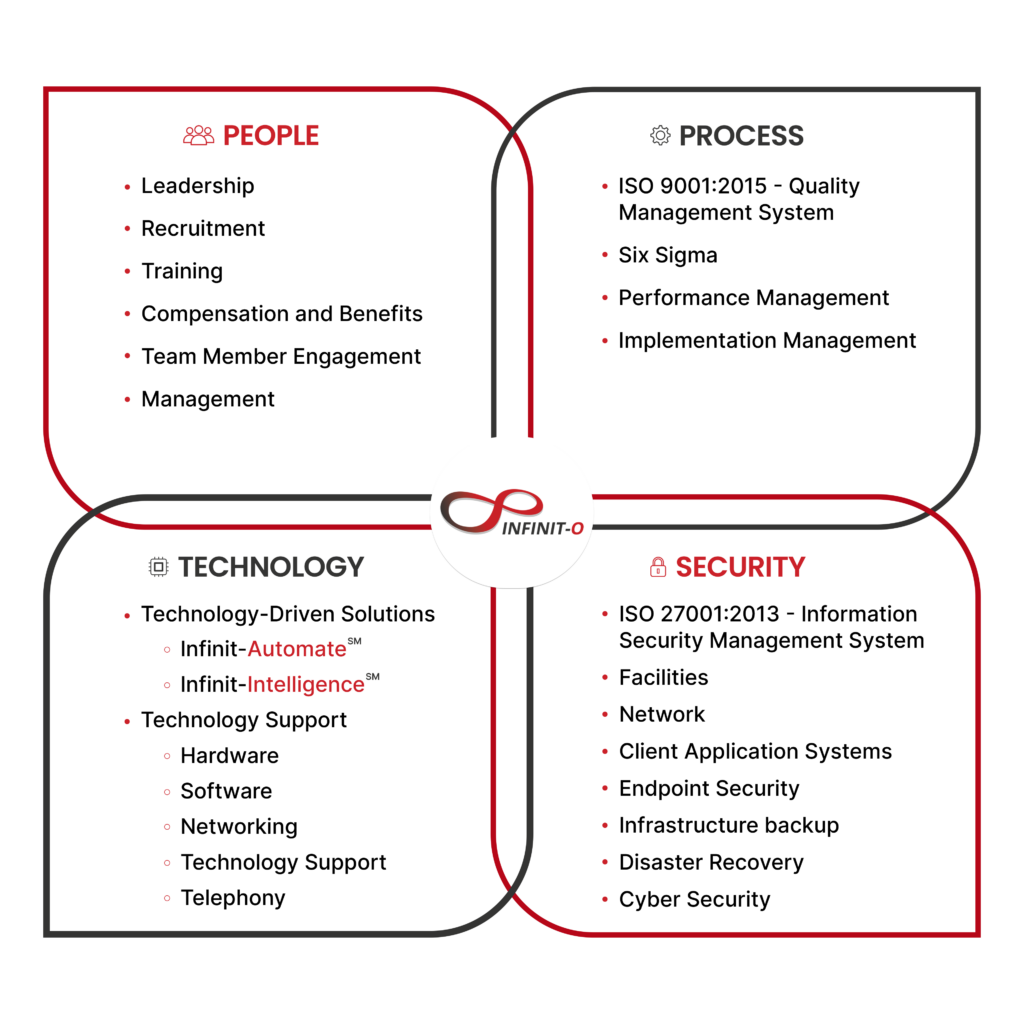Revenue Cycle Management in Healthcare: Top Trends and Figures
Revenue Cycle Management (RCM) is the lifeblood of the healthcare industry, as this area in healthcare operations helps hospitals, home healthcare facilities, laboratory and diagnostic centers, and other medical service providers collect payment from patients. Yet, RCM can be too complex—requiring manual-intensive checking and processing of data to track revenue from initial delivery of healthcare to patient recovery.
In the coming years, we should see improvements in RCM processes and workflows, thanks to technologies like artificial intelligence, automation, and outsourcing. Take a look at key statistics and trends that can shape a better future for healthcare, especially in the RCM department.
![[Infographic] Revenue Cycle Management in Healthcare: Top Trends and Figures](https://resourcecenter.infinit-o.com/wp-content/uploads/2021/05/Infinit-O_info1-edit1-min.png)
Industry Trends and Figures in Revenue Cycle Management
With RCM taking care of the billing and payment processes, providers have continued access to financial resources necessary to maintain healthcare systems and the services they provide.
Considering the significance of RCM in your operations, it would be best to stay updated on industry trends, accelerate innovation, and respond to the most pressing challenges in healthcare. To achieve these goals, you can take advantage of new healthcare solutions that are more attuned to the needs of patients and, at the same time, enable you to deliver healthcare that meets industry standards.
In the following section, we’ll discuss the latest trends on healthcare and RCM, as well as how outsourcing can help healthcare businesses keep up with the evolving industry and thrive in the future.
1. AI will keep driving big data analytics in healthcare.
Healthcare took the hardest hit at the onset of the COVID-19 pandemic in 2020. Health systems were not fully prepared to address the urgent need for hospital care for the increasing number of COVID-19 patients. At the same time, patients requiring elective procedures were also waiting for health services.
To ease the situation, health care organizations leveraged artificial intelligence in their data analytics.
A survey by the Center for Connected Medicine and KLAS Research revealed that one-half of healthcare providers had used AI tools for contact tracing, bed capacity management, physician allocation, staff-to-patient ratio, and several other use cases to help them manage COVID-19 and administer care to the public.
With or without a pandemic, AI will continue to provide invaluable healthcare assistance through various applications of big data. If you’re managing a healthcare facility, you’ll want to be able to quickly look at your hospital dashboard containing multiple data sets like number of inpatients versus outpatients, number of staff per division, average treatment costs, and so on.
Having all this information in one place can help you allocate—quickly and efficiently—financial and workforce resources for tasks that can facilitate the revenue cycle process.
Working with data is highly sensitive work which requires a great deal of skill. With outsourcing providers like Infinit-O, you can build a team of healthcare informatics experts that can efficiently integrate data into your healthcare practice without making costly mistakes or spending a lot of time and money in employee training.
2. Health executives see increased adoption of telehealth.
Telehealth refers to the delivery of healthcare services via video communication technologies. Although telemedicine has been around since the late 1960s, its adoption picked up during COVID-19 lockdown periods. In fact, healthcare providers have reported receiving approximately 90% of medical consultations via telehealth during this time.
Besides helping patients receive the care they need in the safety and comfort of their homes, telehealth is proving to be a profitable revenue stream for providers. Unlike in the past, when physicians did not know how to bill teleconferencing patients, today, it’s possible to bill patients depending on the type and extent of work their doctor does for them.
That said, one of telehealth’s sticking points as an emerging trend is the constantly changing policies on billing and reimbursement. Many healthcare practitioners simply do not have the time and energy to spend on administrative tasks. Luckily, this can be solved by outsourcing RCM teams to help with billing telehealth services. For instance, Infinit-O can provide you with a team of medical billers and coders who are well-versed in the telehealth requirements of major insurance providers, thus helping reduce claim denials and improve revenue.
3. Demand for RCM outsourcing will be higher.
RCM services are available globally, from the Asia Pacific to Latin America and North America. Forecasts show the RCM market may be valued at $135.12 billion by 2027.
As one of the drivers of this growing market, RCM outsourcing can be advantageous for your healthcare business, helping you deal with the costs of caring for your patients. RCM outsourcing partners are in charge of administrative work like billing and coding claims. They help ensure that you can receive payment from member patients of insurance companies.
With your outsourcing partner working on these processes, you don’t need to worry about your insurance claims being denied due to certain requirements not being met during the patients’ treatment. As such, you can continue providing quality care and, at the same time, be compensated properly for treating patients and saving their lives.
A net promoter score of at least 60 can be a good yardstick in choosing an outsourcing provider whose industry expertise and care for your business can give you a sense of security and peace of mind. This score is like that sweet spot you’re looking for between saving on your operational costs and making your customers happy.
4. Heightened cybersecurity strategies need to be a priority for healthcare organizations.
Data breaches are rampant in the digital landscape, but perhaps none is more vulnerable than the healthcare sector. In 2018, 66% of healthcare systems became the target of ransomware attacks.
It’s an alarming rate that should make you seriously consider tightening your security systems, as it’s impossible for you to deliver medical care if hackers infiltrate your system containing patient records.
Cybersecurity is not just an added expense, but a necessity in the digital age that also translates to business revenue. By investing in a strong IT healthcare system, you can avoid data breaches and their consequences that can damage both the financial state of your business and the lives of people under your care. You can even go a step further and partner with an IT outsourcing firm that will keep your infrastructure up-to-date and make sure you’re protected from the latest security vulnerabilities as they appear.
5. Automation will remain a top strategy to deal with high-volume claims management.
Submitting claims to health insurance companies and making follow-ups to collect on those can be frustrating. Besides the high volume of transactions, insurance claims tend to be redundant and time-consuming and can cause major roadblocks in managing your account receivables.
All of these challenges can be costly for healthcare organizations. In the United States, providers spend about $471 billion in billing and insurance-related expenses, which isn’t cost-effective, considering that these tasks are rule-based. This means that automation technologies only need to look at those codes or rules to determine an outcome, like whether to approve or deny a claim.
Through automation, you can get these pressing issues in revenue cycle management out of the way, allowing you to focus more on helping patients while also making a profit for your business. Since automation is a broad field, make sure to work with an outsourcing provider that specializes in automating healthcare-related tasks to minimize errors and ensure data integrity. Even better: hire an outsourcing provider that can help you with both healthcare RCM and IT needs. Infinit-O not only can build RCM teams to handle your billing concerns, but also has a well-established infosec system that is HIPAA and GDPR compliant to ensure patient data security and prevent data breach.
High-Impact Trends in Revenue Cycle Management
Quality, sustainable healthcare begins with revenue cycle management. RCM ensures that medical service users get the support they need and organizations generate revenue for their business. For the future, the outlook for RCM remains positive, as high-impact trends promise innovations necessary to drive more value for patients and healthcare providers.
As a provider of healthcare outsourcing services, Infinit-O ticks the right boxes for all your business goals, whether you’re aiming for:
- Operational excellence;
- A great, high-performing healthcare team capable of addressing your business’s unique needs;
- Operational cost savings of up to 70%;
- An ISO 27001 and 9001 certified partner, and GDPR-, HIPAA-, and DPA20212-compliant; or
- Sense of security and peace of mind through 71 Net Promoter Score

Inquire about our healthcare outsourcing services today!
Start small. Exceed expectations. Think infinitely. Think Infinit-O.







This site is protected by reCAPTCHA and the Google Privacy Policy and Terms of Service apply.